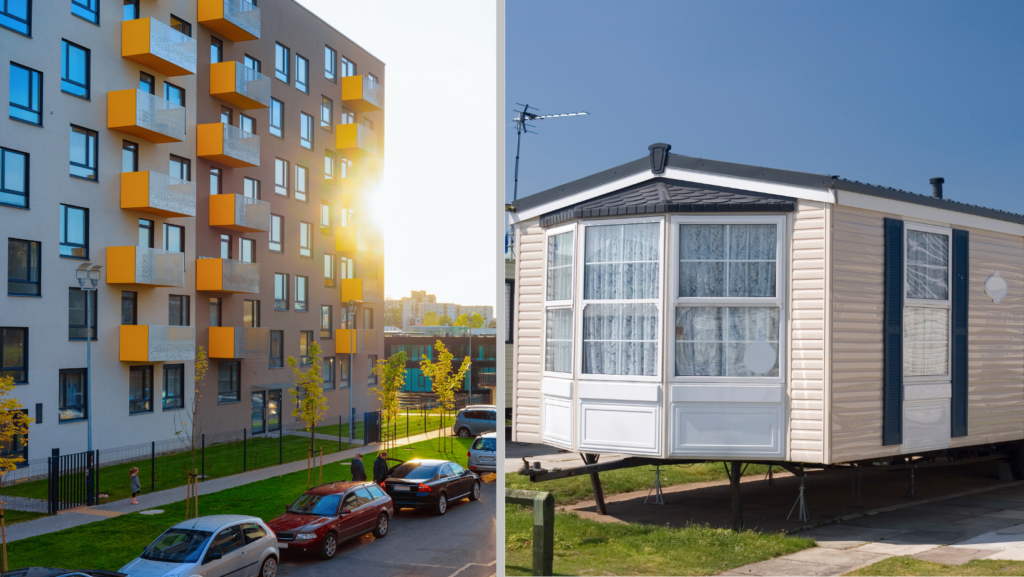Investing in Mobile Home Parks vs Apartments: Rent Ceilings
-
 Tristan Hunter - Investor Relations
Tristan Hunter - Investor Relations
Introduction: The Peak of Apartment Rents
It seems apartment rental rates have hit a peak, stabilizing amid a sluggish U.S. economy after the Covid-19 Pandemic. All the while, the average apartment rental rate approaches $2,000 monthly. Compared to the minimum wage, this is far from sustainable nor even realistic. The question beckons, how does investing in mobile home parks and the lots rents compare? Are they approaching their maximum affordability and is this still an avenue that has potential for bridging the affordable housing gap, while potentially securing solid returns?
Let’s discuss!

The Challenge with Apartment Rent Sustainability
Diving into why apartment rents have hit their ceiling uncovers a whole other issue in itself. The expectation that rents could continually climb above $2,000 seems unrealistic considering the income required to afford such rents. Under the traditional guideline that housing costs should not exceed 30% of one’s income, the average salary in the U.S. should be $6,000 per month when in reality it’s only around $4,700. The fact is, many at this income level might prefer homeownership over paying high rents. Historically, apartments served as transitional housing for those aiming to eventually purchase homes. However, with rents soaring above $2,000, the line between apartment dwellers and homeowners blurs, challenging the traditional housing ladder. Despite the narrative that the average home price is $400,000, more affordable homes exist, suggesting that apartments may have overreached as an alternative to homeownership. The influx of new apartment developments, aiming to capitalize on high rents, has saturated the market, complicating the situation further.
Investing in Mobile Home Parks: Lot Rents Compared
In contrast, mobile home park lot rents offer a different perspective. While not officially tracked, it’s estimated that the average lot rent in the U.S. is about $300 monthly, significantly lower than apartment rents. This affordability is striking, with incomes needed for such rents often falling well below the minimum wage in many states. Even under institutional ownership, where rents might reach $500, they still align with minimum wage earnings and the traditional housing costs guideline. Mobile home parks typically present a distinctive, unsubsidized form of affordable housing. This is mainly because zoning restrictions have prevented the development of new mobile home parks for decades.
Download our free eBook on the “Top 20 Things Learned from Mobile Home Park Investing “
By Andrew Keel

Investing in Mobile Home Parks: Ownership and Costs
A common oversight may be the cost of mobile homes themselves. However, most residents own their homes outright, with the remainder having minimal mortgage payments on their relatively inexpensive homes. For the vast majority, lot rent is their primary housing expense.
The potential for growth in mobile home park lot rents is substantial, given their current affordability compared to apartments. Mobile home park lot rents being significantly lower provides a potentially unique advantage for both residents and investors. This affordability gap not only underscores the value proposition of mobile home parks but also highlights their potential for rent increases without compromising occupancy rates.
The Growth Potential of Mobile Home Park Lot Rents
Given the constrained supply, with no new mobile home parks being developed due to long-standing zoning restrictions, the demand for affordable housing options remains historically high. This scenario typically creates a favorable environment for lot rent adjustments. Mobile home parks have historically operated with lower rent increases compared to the apartment sector, suggesting more room for growth, especially as the apartment rental rates continue to increase. This potential is further supported by the fact that in certain markets, lot rents have begun to approach $1,000 per month without deterring demand. Such examples indicate a resilient market that could bear higher rents, especially in areas where affordable housing options are limited.
Majority of residents owning their homes outright provides a more stable resident base. This stability is a critical factor that could support gradual rent increases, as the cost of relocating a mobile home is substantial ($5,000+), making residents more likely to accept reasonable rent hikes.
However, any strategy to adjust lot rents must be approached with caution. Investors and mobile home park owners should consider the broader impact of significant rent increases on the affordability of mobile home park living as well as the livelihood of their residents. The goal should be to find a balance that ensures your residents are happy and that the mobile home park remains an affordable housing option while also providing a fair return on investment. This requires a deeper understanding of each market’s dynamics, including resident income levels, the availability of alternative housing options, and the overall demand for affordable housing.
Conclusion: Re-evaluating Mobile Home Park Rent Strategy Vs Apartments
While apartment rental rates may have reached their peak in many markets, mobile home park lot rents still have potential for growth. However, this growth must be approached cautiously to preserve the affordability and attractiveness of mobile home parks as an essential component of the housing landscape. Furthermore, the residents must also be considered in this equation as the goal is to foster socio-economic development within this asset class.
For investors, mobile home parks present an enticing opportunity, not only for potential rent increases but also for their role in addressing the pressing demand for affordable housing. As we progress, the significance of balancing profitability with social responsibility cannot be overstated. Happy investing!
Welcome to Keel Team Mobile Home Park Investments, where our mission is two-fold: to elevate communities and to potentially maximize investor returns. Our focus is on enhancing the quality of life for residents while potentially securing strong profits for our partners. We invite you to connect with us through the contact information provided below to delve into our investment approach and strategy in greater detail. Let’s work together to build thriving communities and successful investments.
Learn more about mobile home park investing.
Interested in learning more about mobile home park investing? Get in touch with us today to find out more.
Disclaimer:
The information provided is for informational purposes only and should not be considered investment advice, nor a guarantee of any kind. There are no guarantees of profitability, and all investment decisions should be made based on individual research and consultation with registered financial and legal professionals. We are not registered financial or legal professionals and do not provide personalized investment recommendations.

Tristan Hunter - Investor Relations
View The Previous or Next Post
Subscribe Below 👇





